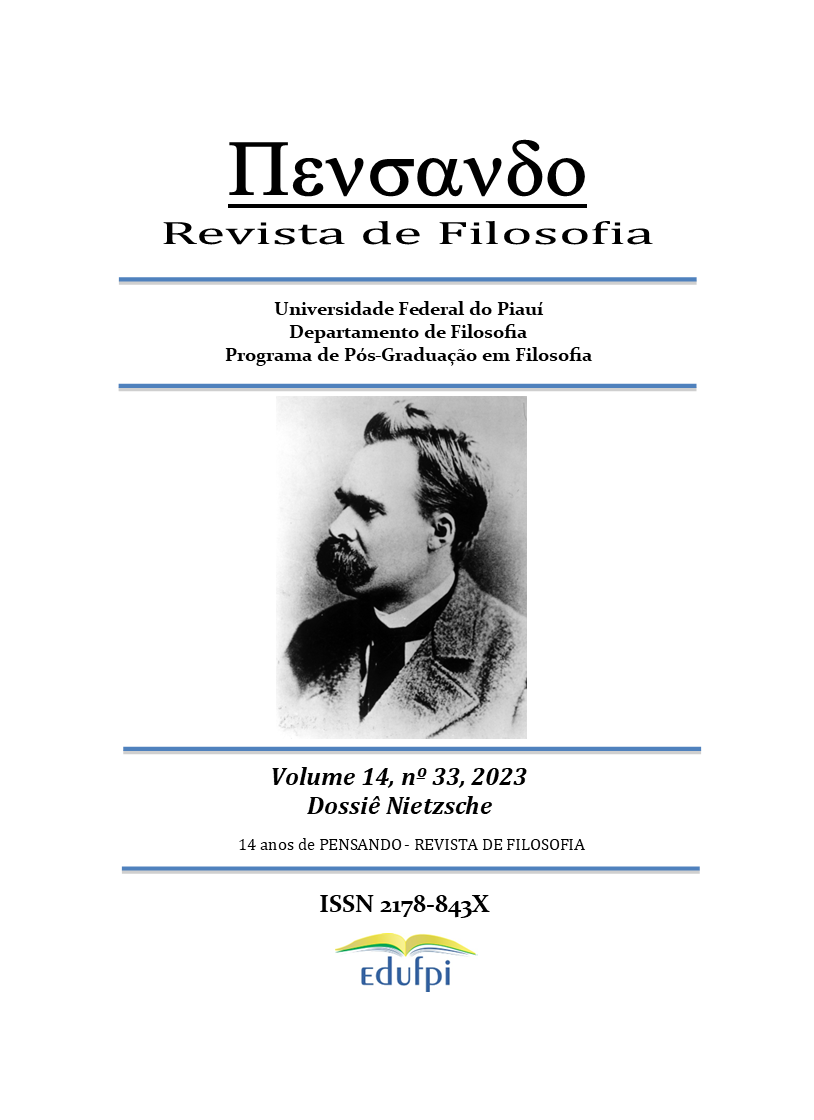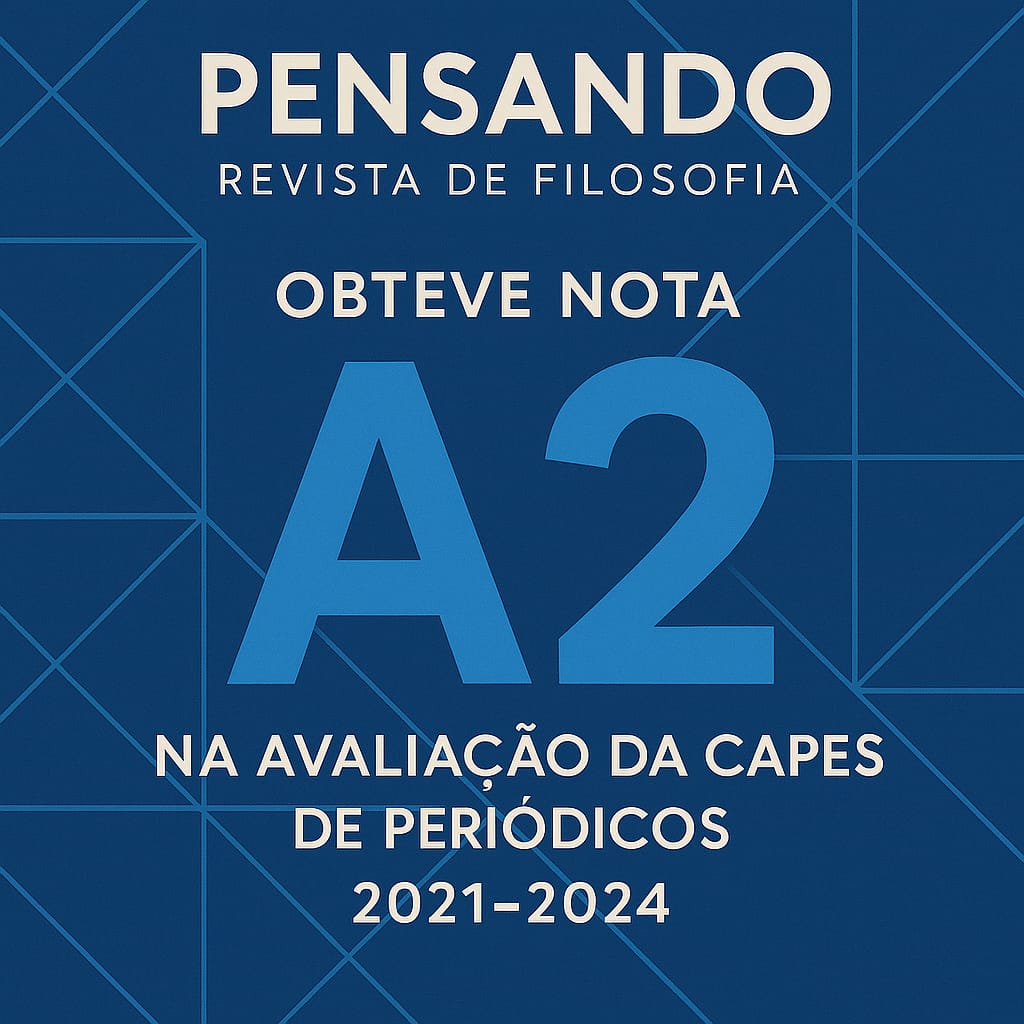El pensamiento planetario de Nietzsche en Así hablo Zaratustra
DOI:
https://doi.org/10.26694/pensando.vol14i33.5014Resumo
Afirmar nuestra responsabilidad hacia la tierra es el corazón de la instrucción del famoso libro Así habló Zaratustra. Para Nietzsche, la responsabilidad clave de las futuras generaciones de filósofos es cuidar la tierra y parte de esta ética del cuidado es la idea de que tenemos que devolver al ser humano a la naturalidad y reconectarnos con otra vida que no es humana. Este artículo intentará conectar los desarrollos recientes en las humanidades y las ciencias sociales, el "giro vegetal" y el "giro planetario", y relacionar ambos desarrollos con la cuestión candente de cómo deberíamos habitar este planeta ahora que nuestra propia actividad está creando. habitable para tantos miembros de la comunidad de vida. Nos preguntamos qué nos podía enseñar la filosofía de Nietzsche, y su libro Así hablaba con Zaratustra de tiernos puentes entre mundos y de reconectar al ser humano con la vida terrestre y planetaria. El objetivo de mi artículo es extraer lo que llamo el pensamiento planetario de Así hablo Zaratustra a través de tres ideas claves del libro: 1. la idea del ser humano en tanta tensión entre lo animal y lo sobrehumano; 2. la idea del filósofo en tal árbol, y más concretamente la imagen de Zaratustra como una clavija; y 3. la idea de la virtud que regala. Pensar en el humano como una cuerda, en el filósofo como una planta y la virtud que le otorga proporciona formas de reconsiderar nuestra relación con los demás, incluso cuando ese otro no es humano, lo cual es muy relevante hoy en una época de colapso ambiental. Estas tres ideas o imágenes ofrecen pistas para entender a Nietzsche como un pensador planetario que entiende la vida humana como arraigada en la tierra y al mismo tiempo conectada con la atmósfera. En Nietzsche, este vínculo con la tierra y lo planetario es inseparable de nuestra responsabilidad por la tierra, reconociendo que somos una especie de cuidadores profundamente arraigados en la vida terrestre y planetaria.
Referências
Chakrabarty, Dipesh. The Climate of History in a Planetary Age. University of Chicago Press, 2021.
Coccia, Emanuele. The Life of Plants: A Metaphysics of Mixture. Polity, 2018.
Gagliano, Monica, John C. Ryan and Patrícia I. Vieira, editors. The Language of Plants: Science, Philosophy, Literature. University of Minnesota Press, 2017.
Latour, Bruno. Facing Gaia. Eight Lectures on the New Climate Regime. Polity Press, 2017.
Lemm, Vanessa. “Posthumanism and Plant Studies.” Palgrave Handbook of Critical Posthumanism, edited by Stefan Herbrechter, Ivan Callus, Manuela Rossini, Marija Grech, Megen de Bruin-Molé, and Christopher John Müller, Palgrave, 2022, pp. 841–858.
Vanessa Lemm, "Rooted in Other Worlds: On the Plant and Planetary Turns in Plato and Dostoevsky" in The Herbarium Tales, eds. Prue Gibson and Sigi Joettkandt. London: Open Humanities Press (forthcoming).
Vanessa Lemm, “Plant Imaginaries and Human Existence in Nietzsche and Sartre” in Nietzsche, ed. James Porter, Cambridge Studies in Literature and Philosophy, ed. Anthony J. Cascardi, 210-229. Cambridge: Cambridge University Press, 2023.
Marder, Michael. Plant-thinking: A Philosophy of Vegetal Life. Columbia University Press, 2013.
Nietzsche, Friedrich. La gaia sciencia (Trad. Diego Sánchez Meca Et. Al., en Obras completas Vol. III., Tecnos, Madrid, 2014.
Nietzsche, Friedrich, Así hablo Zaratustra, Trad. Sánchez Pascual. Alianza, Madrid, 1983.
Nietzsche, Friedrich. Trad. Diego Sánchez Meca Et. Al., Fragmentos Póstumos Vol. II., Tecnos, Madrid, 2008.
Nietzsche, Friedrich, La genealogia de la moral, Trad. Andrés Sánchez Pascual. Alianza Editorial, Madrid, 2005.
Plato. Timaeus and Critias. Translated by Robin Waterfield. Oxford University Press, 2008.
Plato. Theaetetus and Sophist. Translated by Christopher Rowe. Cambridge University Press, 2015.
Sloterdijk, Peter. Globes: Spheres II: Macrospherology. The MIT Press, 2014.
Spivak, Gayatri Chakravorty. Death of a Discipline. Columbia University Press, 2003.
Downloads
Publicado
Como Citar
Edição
Seção
Licença
Copyright (c) 2023 PENSANDO - REVISTA DE FILOSOFIA

Este trabalho está licenciado sob uma licença Creative Commons Attribution 4.0 International License.

























